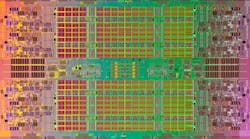Diane Bryant, the president of Intel’s data center business, is taking six to eight months of extended leave “to tend to a personal family matter,” the company’s chief executive Brian Krzanich wrote in an email to employees Wednesday.
Replacing her as the general manager of the business is Navin Shenoy, the general manager of the client computing group, which has struggled in recent years with slowing personal computer sales. It was hit hardest last year when Intel said that it would cut 12,000 jobs as part of its strategy to invest in cloud computing and sensors.
The change in roles is not insignificant. Intel, which is seeking to hold onto its dominant position in server chips, is sailing into stormier waters with Advanced Micro Devices' return to the data center and the introduction of new chips based on blueprints from ARM Holdings, which has reigned the smartphone market for years.
Venkata Renduchintala, Intel's new chief of engineering, will temporarily take over the client computing unit. The company is seeking a permanent replacement for Shenoy, who will report to Krzanich in his new role.
Shenoy's role change is the latest shuffle in Intel's executive ranks. The alterations come only a month after Intel announced bigger roles for both Bryant and Renduchintala, who has been given broad authority over the Internet of Things and personal computer business since he was hired from Qualcomm in late 2015.
What stands out is how many outsiders Krzanich has enlisted to Intel's traditionally homegrown ranks. Other recent additions include Tom Lantzch, ARM's former executive vice president of strategy, who was hired in December to improve Intel's odds in the market for blue-collar computing jobs in sensors and factories.
Other executives have been recruited to plot Intel's strategy in the fast-growing market for driverless car technology. Kathy Winter, a former software and services executive at Delphi, slid into a general manager role in Intel's new autonomous driving group last year.
The upper echelons of the data center unit have seen fewer of these changes. Bryant, who started at Intel in 1985, has been responsible for the unit's strategy and product development since 2012. The business, which accounts for almost a third of Intel's sales, may hit snags in the future as competitors target the spending habits of Google and other internet firms.
Intel controls over 99% of data center market and rival suppliers are increasingly trying to break up its empire. This year, Qualcomm and Cavium made significant steps to that end, with Microsoft buying their ARM server chips for its internal data center operations. Intel will also have to fend off AMD, which will likely release its Naples chips this quarter.
For its part, Intel is betting that its next generation of server chips, to be released in the next few months, will smother competitors. Few details have been shared about Intel's Xeon Processor Scalable chips, but the company says they will have almost four times better scalability for virtualized workloads than earlier devices. The chips, Intel says, will have the “biggest platform advancements in this decade."
Bryant will return to a new job at Intel, but the specifics of that role are not yet clear.
“Over the past five years, Diane has transformed DCG from a server-centric group to a business that spans servers, network and storage across all end-user segments,” Krzanich said in the employee email. “I look forward to welcoming her back to her next challenging role.”
